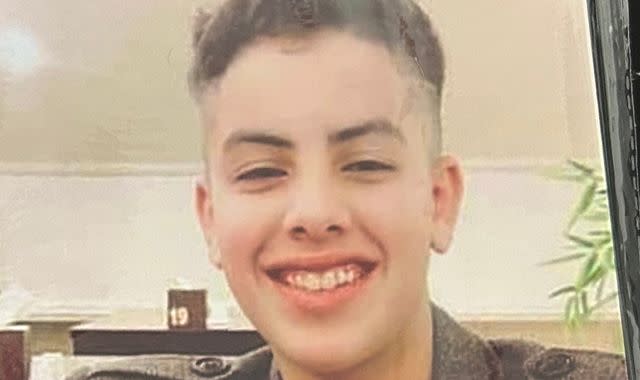'They are killing children': West Bank family sees their son shot dead 'by Israeli troops' outside their home

It is two years since I was last in the West Bank, and today it is a different place.
Beyond the Israeli checkpoints guarding ever-expanding Jewish settlements, illegal in international law, is a Palestinian population more squeezed than ever before.
We pass shops shuttered, streets deserted and Palestinian communities cut off.
A huge new highway cuts through the landscape. It's a road for Israelis, linking Israel to the West Bank settlements.
Israel-Gaza latest: IDF 'to allow more people to leave al Shifa hospital'
We're trying to reach the Palestinian town of Tulkarm and it's hard going.
At one roadblock, we stop to talk to the Palestinians beyond.
"The Israelis closed it," the young man says. "We have businesses everywhere here… we can't work. It has been closed for about 35 days."
Then he looks beyond me and backs off quickly. Behind, the Israeli military has turned up.
The Israeli crackdown here in the West Bank intensified after the Hamas attacks from Gaza on 7 October.
On the face of it, it's about maintaining security and foiling terror threats. But combined with a massive spike in attacks by Israeli settlers against Palestinians, including forced displacement, it represents a shocking shift in violence against Palestinians.
It took a while, but we reached Tulkarm eventually. We'd come to meet the Mahmeed family.
"The martyr's family?" a man says when we ask for directions.
The "martyr" is a 15-year-old boy. Ibrahim and Naheda Mahmeed lost their son two weeks ago. They had watched from the balcony of their home as Taha was shot dead below them.
The whole thing was caught in a horrifying video filmed by Taha's sister, Sarah. She had been on the balcony at 3.30am on 18 October.
Taha had heard that the "occupier forces", as they call them, were in their town. He and a friend had gone out, a few metres from his home, to see what was going on.
As Taha leaned his head out into the main road, there were three shots. Taha fell to the ground. Sarah's screams on the video are piercing and haunting. She'd just filmed her brother being killed.
Moments later, she filmed her father running out to help his son. He too was shot. The video shows him struggling back to the house.
Ibrahim is out of hospital now; his physical wounds are healing. He showed me the entry wound in his back and the much larger exit wound in his stomach.
"I saw my son lying on the floor, with no value, like an animal," he told me.
He repeated what he said he had shouted to the Israeli soldiers up the street.
"I am a father. The boy has been killed. I ask for mercy. Then I heard bullets around me and they hit my back."
Taha is one of at least 52 children to be killed in the West Bank by the Israeli military since the Hamas attacks in southern Israel on 7 October. That's more than any other month since 1967.
According to the Defence for Children International, a NGO (non-governmental organisation), 97 children have been killed in the West Bank in 2023, the majority of them in the last two months.
"If this was your son, and what they did to Taha, they did to your son, will you accept to live with them?" his mother asks me, waiting for my reply.
Read more:
Israel urges Palestinian civilians in southern Gaza to 'evacuate'
Israel now occupies Gaza having completely destroyed it - so what does it do now?
"They are killing children, all the children who were killed were like Taha, they went to buy things in the shops and rockets fell on them.
"And children, aged 10, 11, 14… and Taha was 15. Most of them are under 20."
The shooting had happened at 3.31am, according to the time stamp on the video which Taha's sister shared with Sky News.
Another of Sarah's videos shows the Palestinian ambulance arriving. It is time-stamped 4.44am. That is an hour and 13 minutes after Taha was shot.
It is common for ambulances to be refused access for "security reasons". In this case it is unlikely it would have made any difference - one of the shots struck Taha in the head.
Sky News has asked the Israel Defence Forces for information about the circumstances leading to Taha's death. The IDF said it would respond to us, but it has yet to do so.
In the name of Israeli security, you have to wonder what impact that has on the people in the West Bank - on the next generation of Palestinians.
"Do you think it is possible for Palestinians and Israelis to live alongside each other?" I asked Taha's sister, Sarah.
"No," she answers, with no hesitation. "No. It's our land. Just for us."
"All of it?" I ask. "The West Bank? Or all of it?"
"All. It's our land," she says.
Western politicians say a two-state solution remains the only fix for this profound problem. That doesn't make it a solution that feels remotely possible.
My time back in the West Bank has been deeply depressing.

 Yahoo News
Yahoo News 
